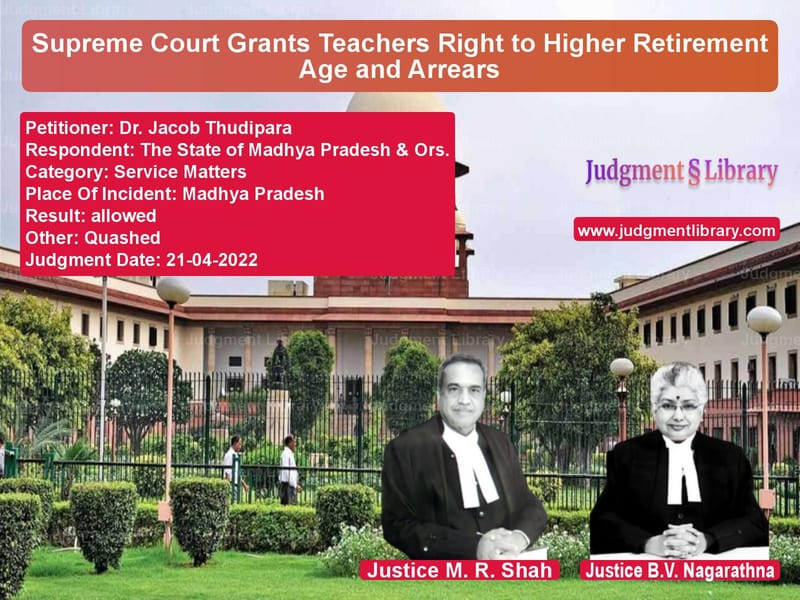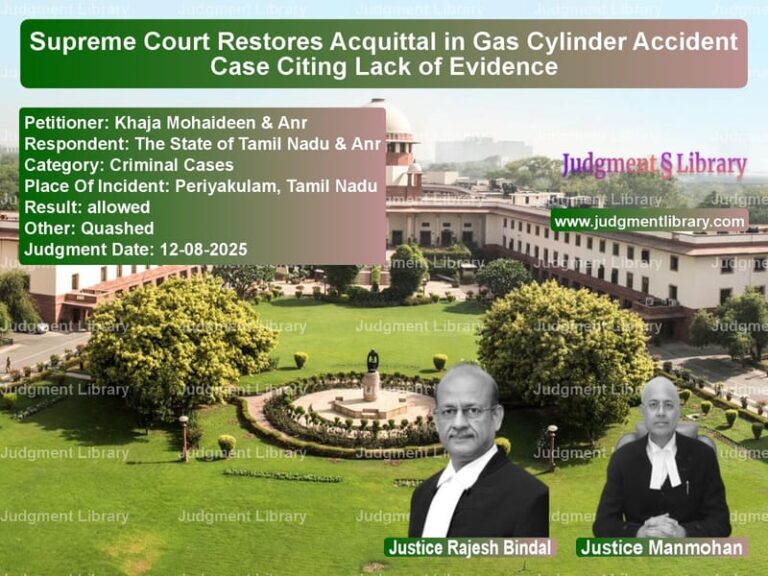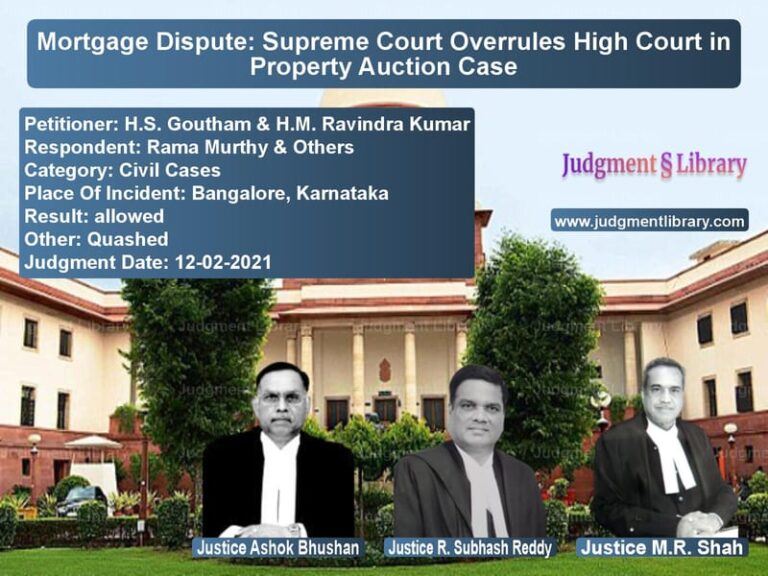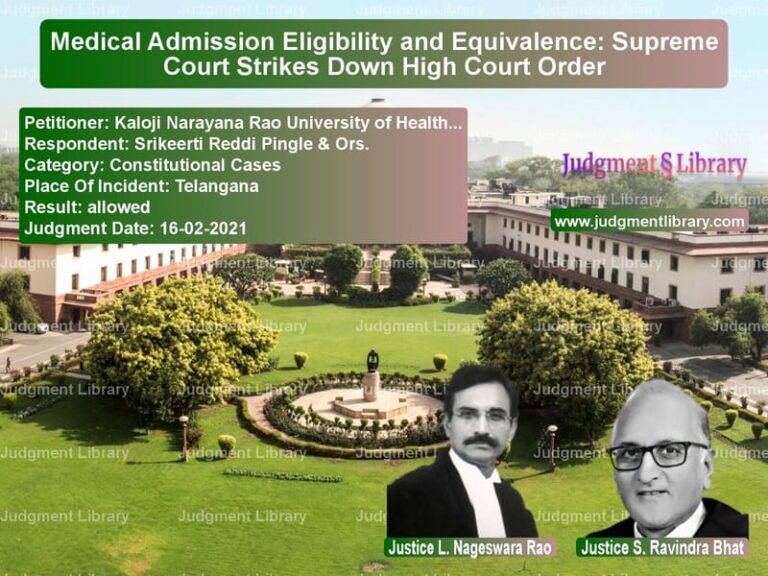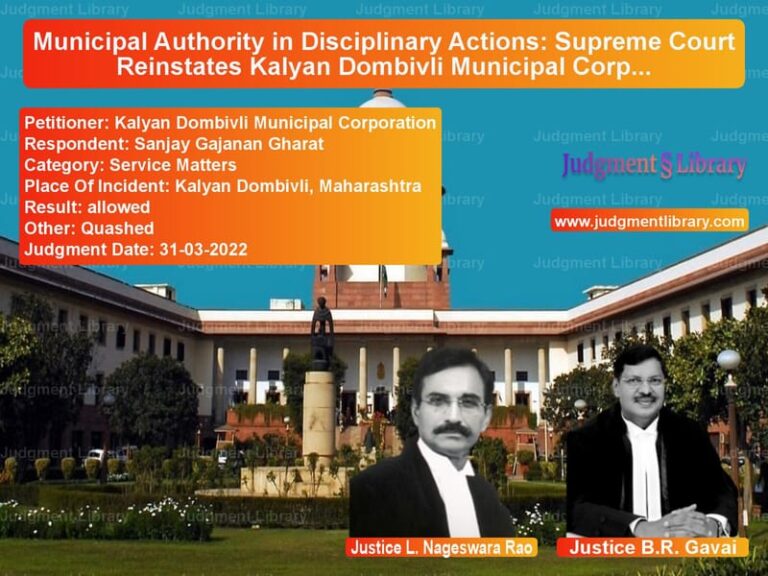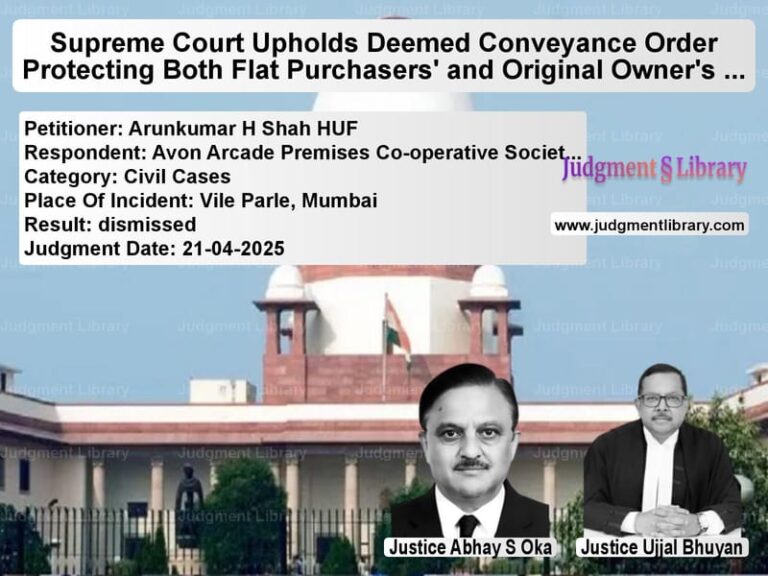Supreme Court Grants Teachers Right to Higher Retirement Age and Arrears
The legal dispute in Dr. Jacob Thudipara vs. The State of Madhya Pradesh & Ors. revolved around the retirement age of teachers in 100% government-aided private institutions. The primary issue was whether these teachers were entitled to the enhanced retirement age of 65 years like their counterparts in government colleges and universities. The Supreme Court, in its ruling, not only upheld their right to extended service but also directed the government to pay all monetary benefits including arrears for the intervening period.
Background of the Case
The appellant, Dr. Jacob Thudipara, was serving as a teacher in a 100% government-aided private college. At the time of his retirement, the Madhya Pradesh government had enforced different retirement ages for government college teachers (65 years) and teachers in aided private colleges (62 years). This discrepancy led to multiple legal battles as affected teachers challenged the policy on grounds of discrimination and inequality.
Key developments in the case:
- 2015: The Full Bench of the Madhya Pradesh High Court, in Dr. S.C. Jain vs. State of Madhya Pradesh, ruled that teachers in government-aided private institutions were not entitled to the enhanced retirement age of 65 years.
- 2016: The appellant and other similarly placed teachers filed Writ Appeals before the High Court, challenging the denial of benefits.
- 2019: The Supreme Court, in Dr. R.S. Sohane vs. State of M.P., set aside the High Court’s ruling and held that aided college teachers were entitled to retirement at 65 years.
- 2021: The Madhya Pradesh High Court implemented the Supreme Court’s decision and directed the government to pay monetary benefits to similarly placed teachers.
- 2022: The Supreme Court ruled in favor of Dr. Jacob Thudipara, granting him retirement at 65 years with full salary and allowances for the intervening period.
Petitioners’ Arguments
The appellant, represented by his legal counsel, argued:
“The denial of enhanced retirement age to aided college teachers is discriminatory and violates the principle of equal pay for equal work. If government college teachers can retire at 65 years, there is no justification for treating aided college teachers differently.”
Key points raised:
- The UGC guidelines prescribed a uniform retirement age of 65 years for all teachers in higher education.
- Government-aided colleges were fully funded by the state, and their teachers performed the same duties as government college teachers.
- The Madhya Pradesh High Court’s ruling in 2015 was inconsistent with the Supreme Court’s later ruling in 2019, which granted aided teachers the right to extended service.
- The principle of ‘no work, no pay’ should not apply because the teachers were wrongfully prevented from continuing their service.
Respondents’ Arguments
The State of Madhya Pradesh, represented by government counsel, countered:
“The government’s policy distinguished between government college teachers and aided college teachers based on administrative requirements and financial considerations. The appellant did not work beyond 62 years, so he is not entitled to salary for the intervening period.”
Key arguments:
- The appellant did not work beyond 62 years, and under the principle of ‘no work, no pay,’ he was not entitled to monetary benefits.
- The distinction in retirement age was historically established and had been followed in various states.
- Paying arrears would create a financial burden on the state and open the floodgates for similar claims.
Supreme Court’s Observations
The Supreme Court bench, comprising Justices M. R. Shah and B.V. Nagarathna, ruled in favor of the appellant and made the following observations:
“The teachers were wrongfully prevented from serving up to the age of 65 years, though they were entitled to it. Therefore, they cannot be denied the monetary benefits for the intervening period.”
The Court held that:
- The Full Bench of the Madhya Pradesh High Court had erred in denying the enhanced retirement age to aided college teachers.
- The principle of ‘no work, no pay’ could not be applied in this case because the teachers were prevented from working due to government action.
- Since the Supreme Court had already ruled in favor of teachers in the Dr. R.S. Sohane case, all similarly placed teachers, including the appellant, must be granted benefits retrospectively.
Final Ruling
The Supreme Court allowed the appeal and ruled:
- The appellant is entitled to retirement at 65 years, like government college teachers.
- The State of Madhya Pradesh must pay the full salary and allowances for the intervening period.
- The arrears must be paid within six weeks from the date of judgment.
- However, no interest would be granted on arrears due to the delay in filing the appeal.
Conclusion
The Supreme Court’s ruling reinforces the principle of equal treatment in public employment and upholds the rights of teachers in government-aided colleges. It sets a precedent that states cannot arbitrarily distinguish between categories of teachers when they perform the same duties. The decision ensures justice for those who were denied their rightful service tenure and monetary benefits due to flawed government policies.
Read also: https://judgmentlibrary.com/supreme-court-rules-on-guest-faculty-employment-rights-and-limitations/
Petitioner Name: Dr. Jacob Thudipara.Respondent Name: The State of Madhya Pradesh & Ors..Judgment By: Justice M. R. Shah, Justice B.V. Nagarathna.Place Of Incident: Madhya Pradesh.Judgment Date: 21-04-2022.
Don’t miss out on the full details! Download the complete judgment in PDF format below and gain valuable insights instantly!
Download Judgment: dr.-jacob-thudipara-vs-the-state-of-madhya-supreme-court-of-india-judgment-dated-21-04-2022.pdf
Directly Download Judgment: Directly download this Judgment
See all petitions in Employment Disputes
See all petitions in Pension and Gratuity
See all petitions in Public Sector Employees
See all petitions in Judgment by Mukeshkumar Rasikbhai Shah
See all petitions in Judgment by B.V. Nagarathna
See all petitions in allowed
See all petitions in Quashed
See all petitions in supreme court of India judgments April 2022
See all petitions in 2022 judgments
See all posts in Service Matters Category
See all allowed petitions in Service Matters Category
See all Dismissed petitions in Service Matters Category
See all partially allowed petitions in Service Matters Category

